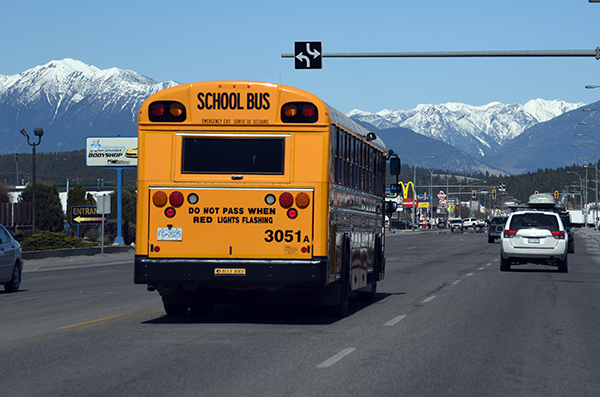Home »

Electric school buses coming to region
School District No. 5 (Southeast Kootenay) and School District No. 6 (Rocky Mountain) are among 13 school districts that have purchased a total of 18 electric school buses that will begin operating in B.C. communities by the end of this school year.
Altogether, the 18 buses can provide service for about 1,300 K-12 students per day to and from school.
SD5 and SD6 will each be getting one electric school bus.
“By shifting gears from diesel to electric school buses, these K-12 students are benefiting from our government’s work to create healthier and more sustainable learning environments across B.C.,” said Premier John Horgan, MLA for Langford-Juan de Fuca. “Electric school buses produce zero emissions and also support CleanBC’s target to reduce greenhouse gas emissions by 40% by the year 2030, helping build a cleaner, healthier future for all of us.”
“I am constantly inspired by youth who push us to think about our environmental impact and their future,” said Jennifer Whiteside, Minister of Education. “By making green investments in transportation and facilities, B.C. school districts can ensure students live, play and learn in cleaner communities that reflect our shared commitments.”
Travel on electric school buses is smoother, quieter and healthier than traditional diesel buses. Overall, electric school buses are highly efficient, produce zero carbon dioxide emissions and are much more cost-effective to operate over time. A zero-emission electric school bus saves about 17 tonnes of greenhouse gas emissions annually compared to a diesel school bus, a Ministry of Education media release stated.
“Our kids deserve a clean, healthy future, and that’s why we’re investing in zero-emission school buses in communities across B.C.,” said George Heyman, Minister of Environment and Climate Change Strategy. “By acting now to address climate change, we’re demonstrating leadership for young people by reducing pollution, improving air quality and building a more secure future for our kids and grandkids.”
Electric school buses have many advantages compared to diesel school buses, including the cost of electricity compared to fuel and fewer moving mechanical parts, which means they require fewer repairs and less maintenance.
The purchase price for each electric school bus is about $350,000, compared to the $150,000 average cost for an equivalent diesel school bus. The Ministry of Energy, Mines and Low Carbon Innovation has allocated supplemental funding of up to $150,000 toward the capital costs of each electric bus.
As a new initiative launched by the Ministry of Education and Ministry of Energy, Mines and Low Carbon Innovation in April 2020, this is the first time school districts in B.C. have been able to purchase electric buses through funding from both ministries. School districts that buy electric buses also have access to provincial funding for charging station infrastructure.
Lead image: A fuel powered SD5 school bus. e-KNOW file photo
e-KNOW file photo
e-KNOW







